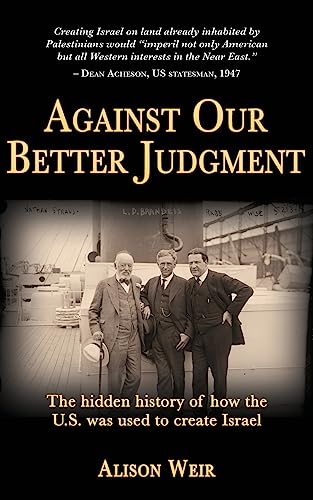Against Our Better Judgment
The Hidden History of How the U.S. Was Used to Create Israel
Alison Weir
BOOK REVIEW

The title Against Our Better Judgment: The Hidden History of How the U.S. Was Used to Create Israel by Alison Weir isn't just an academic exploration; it's a bold confrontation with the untold narratives that have shaped our modern political landscape. In this compelling work, Weir meticulously unpacks the intricate layers of history that reveal how American political decisions and actions contributed to the establishment of Israel, often at the expense of both ethical standards and the welfare of Palestinians.
At its core, Weir's narrative challenges you to rethink the long-held beliefs about U.S. involvement in Middle Eastern politics. Instead of the glorified myths of benevolence often portrayed in mainstream discourse, aspects of this story are starkly tragic. Weir's extensive research serves as a wake-up call, presenting historical facts that many would prefer remained buried. You are not just a passive reader; you are thrust into a whirlwind of complex relationships, diplomatic maneuvers, and the moral quandaries that have defined this contentious issue. Your understanding of Middle Eastern geopolitics will be irrevocably shifted as you navigate through Weir's powerful prose.
This book is uniquely positioned within the larger context of a global narrative. Published in 2014, it taps into the ongoing debates surrounding U.S. foreign policy, offering insights that extend far beyond academic interest. Weir's fearless approach incites not just reflection, but a visceral reaction. As you read, you may find yourself grappling with emotions of anger and compassion as personal stories weave through the fabric of historical events. It compels you to recognize the human cost embedded in the political and ideological conflicts, a reality often sanitized in conventional histories.
Weir challenges the reader with a gritty examination of how the U.S. was not merely a benefactor in the creation of Israel but was utilized as an instrument by various actors within a larger geopolitical game. This is where her brilliance lies. She doesn't just present facts; she reconstructs narratives that have been deliberately obscured. These pages are drenched in the voices of those who have been silenced, giving a platform to the Palestinian experience that is frequently overshadowed.
Readers' reactions to Against Our Better Judgment evoke a tumultuous spectrum. Some laud Weir's courage and dedication, recognizing her as a truth-teller in a time when alternative views are often met with derision. "A must-read for anyone seeking to understand the real dynamics at play," one reviewer asserts passionately, highlighting how the book offers a fresh perspective that contradicts mainstream media portrayals.
However, the work doesn't escape controversy. Detractors argue that Weir's conclusions veer towards sensationalism and oversimplification of complex historical events. Critics claim that her emphasis on U.S. complicity overshadows other factors that contributed to the region's crises. Yet, isn't this discrepancy what makes her book so essential? It provokes necessary discussions and confronts readers with uncomfortable truths. It dares you to question your assumptions about historical narratives that have long gone unchallenged.
Vividly illustrating the transformative power of storytelling, Weir emphasizes the resilience of those marginalized, reminding us that history is always written by the victors. In doing so, she extends an invitation to become more than just observers of history; you are encouraged to become informed advocates for justice and understanding in a world rife with division. The implications of her work ripple through contemporary society, influencing thinkers, activists, and policymakers alike, who grapple with the legacy of these events.
If you embark on the journey that Against Our Better Judgment offers, be prepared to confront uncomfortable truths and engage with history in a manner that is both enlightening and unsettling. You will not simply close the book feeling unchanged; rather, there is a good chance you will feel a compelling urge to action, driven by the urgency to understand and rectify the past. Your intellectual curiosity will be ignited, and you will leave with a profound sense of responsibility toward the narratives that shape our world.
In this age of misinformation and oversimplification, Alison Weir's work stands as a stark reminder of the power of historical inquiry. Don't just read her words-let them compel you to seek out more, to question deeper, and to uphold the stories that deserve to be told. With her piercing insights, you will never again be able to view the complexities of the Israeli-Palestinian conflict-or American foreign policy-through the same lens. Your perspective will shift, illuminating the path toward a more compassionate understanding of a region fraught with conflict and historical weight. 🌍✨️
📖 Against Our Better Judgment: The Hidden History of How the U.S. Was Used to Create Israel
✍ by Alison Weir
🧾 260 pages
2014
#against #better #judgment #hidden #history #us #used #create #israel #alison #weir #AlisonWeir